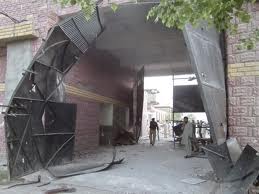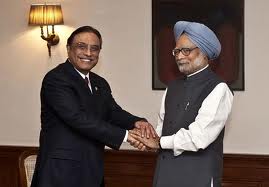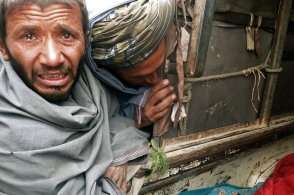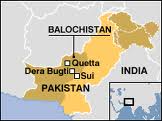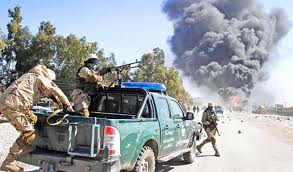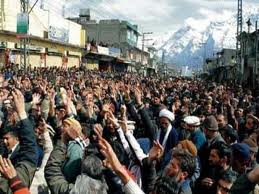Islamabad, Pakistan: Two Pakistani journalists filing reports home from Washington are quietly drawing their salaries from US State Department funding through a nonprofit intermediary, highlighting the sophisticated nature of America’s efforts to shape its image abroad.
Neither of the two media organizations, Express News and Dunya News, discloses that their reporters are paid by the nonprofit America Abroad Media (AAM) on their websites or in the reports filed by their correspondents. Though the journalists have worked under the auspices of AAM since February, AAM only made their links to the news organizations known on their website Wednesday, after being contacted by the Monitor.
The lack of transparency by the Pakistani organizations involved could heighten Pakistani mistrust of the US government, which is seen as having an undue level of influence in their country’s affairs.
“If an American journalist working as a foreign correspondent in Pakistan was paid in a similar manner, would it be morally or professionally acceptable for his news organization or audience?” asks Badar Alam, editor of Pakistan’s prestigious English-language Herald magazine.
The amount currently allocated for the project is some $2 million over two years from the public diplomacy funds allocated by the State Department, according to State Department officials in Washington familiar with the project. That includes salaries for the two correspondents – Huma Imtiaz of Express News and Awais Saleem of Dunya News – and a bureau for both TV channels.
Aaron Lobel, president of AAM, says his organization receives donations from a number of private funders, too, which it mainly spends on its programs on international affairs that run on Public Radio International in the United States.
The timing of AAM’s website disclosure – after contact from the Monitor – was a coincidence and the update had been planned for “several months,” he says. “We are a small organization with two web guys. They are really working hard on the new site – not just about the Pakistan project but on everything we do. Yes, it would have been better to have a lot of information [before]. We have been preparing this site for a long time to provide that information.”
“The content production is done first and foremost [by] Pakistanis who are here and work with their channels back home to produce content,” says Lobel.
Sometimes the Pakistani journalists and editors at home come up with stories. But AAM also holds production meetings where the group’s managing director, Aliya Salahuddin, suggests stories, says Lobel.
“I understand the fears that define the joint ventures that comprise the US-Pakistan relationship. [But] we are very proud we have a good relationship with Dunya and Express. It allows Pakistani journalists to cover the US with a Pakistani perspective. I haven’t encountered any Pakistani channel that doesn’t want to work with us,” he says, adding that AAM is hopeful of partnering with more Pakistani channels in the future.
Both reporters cover a wide variety of stories, some related to the US government and others not.
In her work for the English-language newspaper the Express Tribune, a respected national Pakistani daily that is a part of the Express Media Group, Huma Imtiaz regularly quotes unnamed US officials, at times from the State Department and at times from the Department of Defense.
In a story published Aug. 16, “Strings attached: Talk of US scorecard rubbished,” Imtiaz interviews a Department of Defense official who contradicts an earlier Wall Street Journal report that the US government was making decisions on aid based on Pakistani performance and cooperation.
She has also written for The New York Times, though not since drawing a salary from AAM, and published one essay for the Indian Express on being a Pakistani journalist in America when Osama bin Laden was captured. She also writes for Foreign Policy’s website, where she is credited only as the correspondent for Express News in Washington.
Awais Saleem’s reports include stories on cricket in Chicago and Pakistani fashion in the United States.
Neither reporter was willing to comment on the story.
Making a clear connection
AAM’s ombudsman, Jeffery Dvorkin, insists there is no US government involvement with content production.
“My role as ombudsman is to help AAM ensure there is no effort by its funders, including the government, to interfere with any of the content produced. Thus far, there have been no efforts of this kind. Secondly, AAM continues to make it clear to the government and to all funders that in order for AAM to proceed with this initiative, the government could have no involvement in content production or selection,” he says.
Mr. Dvorkin says his only misgiving was about Lobel’s ability to be the AAM’s chief fundraiser and remain involved editorially at the same time – an issue that has since been resolved with the imminent hire of new managing editor.
But the lack of transparency, particularly by the Pakistani news organizations, raises ethical issues for all parties involved, says Richard Wald, a journalism ethics professor at Columbia University in New York City.
“The essential question here is not who pays, but who knows who pays,” says Professor Wald. “In a correct world, if there were such a situation, people should make the connection clear – not simply to the editors and management of the Pakistani papers – but to the receivers of the information so they can judge it on their own.”
He adds there can be a place for government-funded access to reporting for things like equipment and travel so long as it is clear where the funding is coming from.
The State Department official counters that both the US government and AAM “encourage” the channels to make their ties clear. “We’re very proud of this program,” the official says. But eight months into the program, officials from AAM had not reached out to the channels regarding disclosure.
The official notes that this is part of a broader effort to reach out, including bringing Pakistani journalists to the US for short visits under the International Visitor Leadership Program.
Defending his newspaper’s decision not to disclose the source of Imtiaz’s funding, Express Tribune editor Mohammad Ziauddin told the Monitor: “The lady reports in conjunction with the [nongovernmental organization AAM]. The lady has been recruited by us in consultation with the NGO in a way we do not need to mention this. By putting that line we would be putting this into perspective but since we already edit [her stories] according to our thinking we do not need to. Editorially we sensitize it to a great extent.”
He adds that the process of building links with government officials is commonplace the world over. “I know a number of instances where a correspondent has landed in Pakistan and has been won over by our own information departments and briefed by our government agencies. Obviously they would like to keep his sources intact and at times he or she obliges [the government].”
Ziauddin adds that the partnership was conducted “as an experiment” and in the future the newspaper intends to pay for its own correspondent in Washington, just as they do in London.
Countering environment of misinformation
Christine Fair, a Pakistan expert and assistant professor at Georgetown University in Washington, says it is important to remember that the US government is operating in an environment of misinformation, where anti-US stories in Pakistan seeded by the Pakistani security establishment are commonplace.
“Is anyone calling them out on this? The Pakistani press is the freest press that money can buy,” she says, adding: “The larger story is the Pakistani media is up for sale to as many people want to buy it. This fiction is that the country is really benefiting from some independent media. The US government wants to get into this game to counter this ISI [Inter Services Intelligence] propaganda.”
Naveed Kashif, chief operating officer of Dunya News, also stated that since final control resided with the channel, they did not feel the need to declare the partnership with AAM to their viewers.
(Editor’s note: the original version of this story gave the incorrect name for the chief operating officer of Dunya News.)



